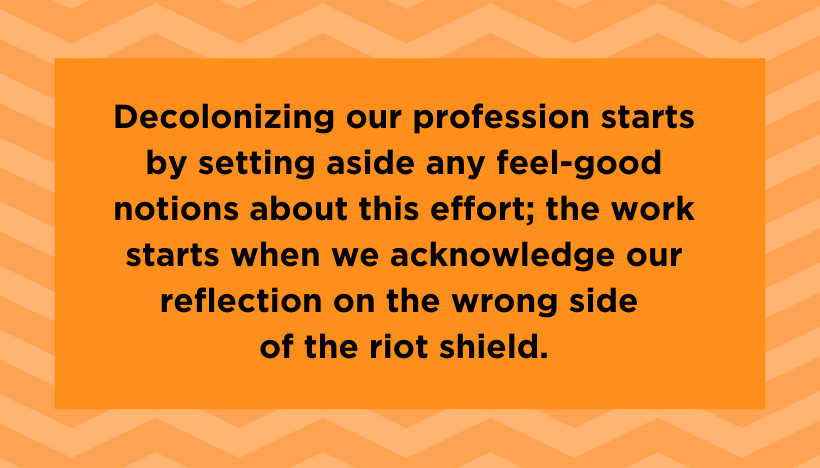From the NCTE Standing Committee on Global Citizenship
This post was written by NCTE member Rex Ovalle, a member of the NCTE Standing Committee on Global Citizenship.
To speak of pedagogies of re-existence, then, is to once again call forth the agency, action, and praxis of the otherwise. It is to raise the existential, philosophic, lived concerns and pedagogical imperatives of freedom, anguish, responsibility, embodied agency, sociality, liberation to which Lewis Gordan refers. It is to signal affirmation and hope in spite of—and in the midst of–conditions of negation, violence, and despair, part of the war of capitalism and the reorganization of modernity/coloniality/heteropatriarchy. It is to recognize that decolonial re-existence in the circumstances of the present times requires creative pedagogies-methodologies of struggle. Herein lies the significance, urgency, and insurgency of decolonial pedagogies rising.
—Catherine Walsh
As a member of NCTE’s Standing Committee on Global Citizenship, I am intrigued by, and eager to trouble, the growing use of the word decolonize.
First, to be clear, I affirm and support the work of my fellow committee members Michael Seward and Kylowna Moton, who hold rigorous and meaningful workshops on decolonizing the ELA classroom at the NCTE Annual Convention. I attended their workshop in the past and found it both meaningful and challenging. That said, in this blog post, I would like to turn our attention to what is happening to the word decolonize in our popular discourse and to humbly posit that the work of decolonizing is much more uncomfortable.
I am intrigued because the word is everywhere. You can find advertisements for t-shirts that say, “decolonize everything.” As a Latinx teacher who works in an entirely Latinx school, I even find my teenaged students using the word decolonize. I am not exactly sure when this happened, but as a lover of this conversation, I was initially excited. Now, I would like to remind my fellow teachers and scholars that this work is not simple, and it is necessarily uncomfortable.
As Catherine Walsh articulates in her collaboration with Walter Mignolo (On Decoloniality: Concepts, Analytics, Praxis, 2018), this work “is to signal affirmation and hope in spite of—and in the midst of—conditions of negation, violence, and despair, part of the war of capitalism and the reorganization of modernity/coloniality/heteropatriarchy” (p. 96).
My hunch is that the growing use of decolonize resonates with the sentiments of the first half of that sentence yet fails to properly acknowledge the second half. Yes. Let’s signal hope, but let’s remember why the work in this field is needed in the first place; let’s confront the “negation, violence, and despair.” Further, let’s remember which side of that sentence it is that teachers, especially teachers of English, have historically participated in.
Decolonizing is not “feel-good” for the English teacher. Instead, it needs to be a thorough accounting of the ways our profession and our lives have depended on the aforementioned conditions. While I may be Mexican American and the son of immigrants, the salary I collect as an English teacher is completely dependent on my proximity and complicity with whiteness, heteropatriarchy, and capitalism.
I invite you to look toward your students as an initial resource; since this past summer, I have been thinking of the students who participated in the protests. I really want to believe that I have empowered my students to take stances that are anchored in their notions of justice; yet unlike them, I was not out on the streets for most of the summer. Even in the spring, my communication with them during the pandemic was focused on encouraging them to graduate and stay motivated in their schoolwork—as if they were not learning things in the protests, as if making it to their Zoom classes on time had anything to do with what their hearts told them. I’m fairly confident that some of my students were more committed to acting on their convictions than I was.
Decolonizing our profession starts by setting aside any feel-good notions about this effort; the work starts when we acknowledge our reflection on the wrong side of the riot shield.
 Rex Ovalle works as high school English teacher and instructional coach at Cristo Rey Jesuit High School in the Pilsen neighborhood of Chicago. He is also a PhD student in the English Education program at the University of Illinois–Chicago.
Rex Ovalle works as high school English teacher and instructional coach at Cristo Rey Jesuit High School in the Pilsen neighborhood of Chicago. He is also a PhD student in the English Education program at the University of Illinois–Chicago.
The Standing Committee on Global Citizenship works to identify and address issues of broad concern to NCTE members interested in promoting global citizenship and connections across global contexts within the Council and within members’ teaching contexts.
It is the policy of NCTE in all publications, including the Literacy & NCTE blog, to provide a forum for the open discussion of ideas concerning the content and the teaching of English and the language arts. Publicity accorded to any particular point of view does not imply endorsement by the Executive Committee, the Board of Directors, the staff, or the membership at large, except in announcements of policy, where such endorsement is clearly specified.

